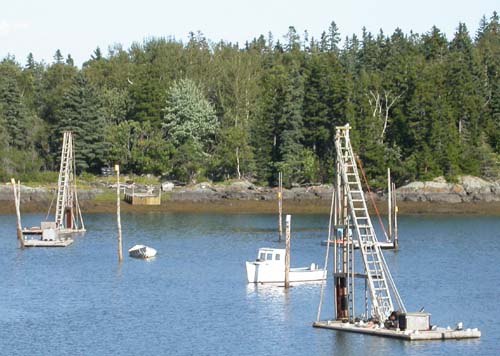I’m sitting in a city park in Bangor, Maine. We’ve become fans of such parks, places where we can stay for hours and write, picnic, use the bathroom, and meet interesting people. Some things are still free.
A garrulous fellow stopped by to chat while we were cooking breakfast. He would have been an interesting companion for our meal, except that his choice of topics was a little too gross for the breakfast table. He got onto the subject of his adult bout with chicken pox and all the complications of it. When he started describing a rectal exam, I wished we’d picked a different park.
Back in upstate New York, we’d stopped for the night in a place called Sharon Springs. It had a number of old hotels, huge multi-story edifices with historical plaques — this one was built in 1910, this one in 1920. Things were always burning down; one block had a plaque saying that it had held the biggest hotel of all, but it had burned down and the block had sat almost vacant for almost a hundred years. It had the feeling of a resort town that had gone under before the Great Depression, and was only starting to come back.
Looking for a quiet place to park for the night, we chose the vacant block, across the street from the Hotel columbia, a small, old hotel. Sitting in the van, invisible behind our tinted windows, we noticed that the folks going into and out of the hotel were all dressed in black. The men had long beards and hats — presumably Orthodox Jew — and drove mini-vans with New Jersey license plates.
In a city park in Canajoharie, a few miles down the road, an older lady with a portable oxygen tank stopped to talk. I asked her about Sharon Springs and the Jewish connection. “Oh yes,” she said, “in the old days — this was before your time — all the Jewish folks used to come up here from the City, on the train.” I thought her topic was wandering as she started telling me about the park in Canajoharie, how it used to be different before it was fixed up, it used to flood a lot, but there was always a lot of fishing there. But she was just setting the stage.
“The Jewish ladies used to sit up here, where the parking lot is, in their long black dresses. When someone would pull in an ugly old carp — you know what a carp is, don’t you? Nasty old bottom feeders — anyway, when someone landed a big old carp, the Jewish ladies would start to clap their hands. Then they’d rush down to the bottom of the hill and try to outbid each other to buy that ugly old fish. They had to take it back to the rabbi, while it was still alive, you know, to be kosher and everything.
“I asked one of those ladies, once, how they cooked the carp. She told me they gutted it, then boiled it until the bones fell to the bottom. Then they fished out the bones and added potatoes and carrots, and made a kind of fish stew.” She made a face at the thought of the stew.
“The Amish used to fish here, too; sometimes you’d see a half a dozen buggies parked here. They never had fishing licenses, and a friend of mine decided to have a little joke once. He drove a volunteer ambulance with a loudspeaker. coming across the bridge, he saw a bunch of Amish folks fishing. Over his speaker, he announced, ‘THIS IS THE GAME WARDEN. I’LL BE COMING DOWN THERE IN FIVE MINUTES TO CHECK LICENSES.’ Well, those Amish folks just went nuts. They grabbed their stuff and ran for the hills. They thought he was for real.” Chuckling at the memory, she went on her way, leaving us to our breakfast picnic.
Yesterday, we spent hours in the city park in Rangely, Maine. It was a beautiful place, just down the road from Mooselookmeguntic. Our Kerry bumper sticker initiated a conversation with a fellow there about books, politics (he saw our Kerry bumper sticker), places. He’s a cross-country ski racer who’s been in Rangely for 45 years, admitting that he came, “before everyone else was here.” When he recommended that we visit a certain part of the Maine coast, we decided to head there next. Given where he lives, he’s a well-qualified judge of beautiful places.

